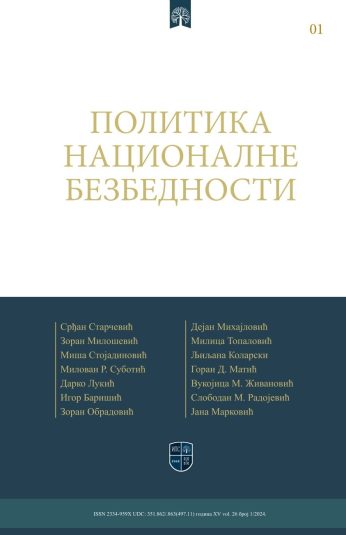Main topic
ARTICLES AND STUDIES
THE US-RUSSIA RAPPROCHEMENT: THE (IM)POSSIBLE DIRECTION FOR A US FOREIGN POLICY
Abstract
The authors of this paper examine the possible change of course in the United States foreign policy and strategic adjustment towards Russia in international relations. Although the United States were the sole superpower in the world after the end of the Cold War, the contemporary international system is marked by growing multipolarity. This change in the international arena is caused by the rise of two revisionist great powers – China and Russia. Although China represents the US’ main geopolitical rival, Russia does not lack the ambition to influence current world affairs. Possible relative gain in Sino-American rivalry for the United States could be achieved through closer cooperation with Russia. Although this hypothetical appeasement could be beneficial for the US, the authors of this paper take the stance that rapprochement between the two countries is currently unlikely. Using neoclassical realism as a theoretical framework, the paper examines the possible US-Russian strategic cooperation, including both external and internal factors that influence state foreign policy and strategic adjustment. The paper also examines the US opening to China during the Cold War under the administration of President Richard Nixon and compares it to the contemporary state of world affairs.
References
- Athwal, Amardeep. 2004. “The United States and the Sino-Soviet Split: The Key Role of Nuclear Superiority.” The Journal of Slavic Military Studies, vol. 17, no. 2: 271-297. https://doi.org/10.1080/13518040490450547
- BBC. 2021. “Nord Stream 2: Biden waives US sanctions on Russian pipeline.” May 20, 2021. https://www.bbc.com/news/world-us-canada-57180674
- Biden, Joseph. 2021a. Remarks by President Biden on America’s Place in the World. February 4, 2021. https://www.whitehouse.gov/briefing-room/speeches-remarks/2021/02/04/remarks-by-president-biden-on-americas-place-in-the-world/
- Biden, Joseph. 2021b. Remarks by President Biden in Press Conference. June 16, 2021. https://www.whitehouse.gov/briefing-room/speeches-remarks/2021/06/16/remarks-by-president-biden-in-press-conference-4/
- Brands, Hal. 2018. “Democracy vs Authoritarianism: How Ideology Shapes Great-Power Conflict.” Survival, 60 (5): 61-114.
- Caldwell, Dan. 2009. “The Legitimation of the Nixon-Kissinger Grand Design and Grand Strategy.” Diplomatic History 33, No. 4: 633-652. https://doi.org/10.1111/j.1467-7709.2009.00801.x
- Dašić, Marko, Stevan Nedeljković i Dragan Živojinović. 2018. „Upotreba istorijskih analogija u procesu donošenja spoljnopolitičkih odluka na primeru odnosa Srbije i Sjedinjenih Američkih Država posle 2000. godine.“ Srpska politička misao, 62(25): 119-139.
- Ditrych, Ondrej. 2014. “Bracing for Cold Peace. US-Russia Relations after Ukraine.” The International Spectator, vol. 49, no. 4: 76-96. https://doi.org/10.1080/03932729.2014.963958
- Gaddis, John Lewis. 2005. Strategies of Containment: A Critical Appraisal of American National Security Policy during the Cold War. Revised and expanded edition. New York: Oxford University Press.
- Goldgeier, James. 2021. “U.S.-Russian Relations Will Only Get Worse.” Foreign Affairs, April 6, 2021.
- Graham, Thomas. 2019. “Let Russia Be Russia.” Foreign Affairs, November/December 2019.
- Kissinger, Henry. 1979. White House Years. Boston: Little, Brown and Company.
- Kuchins, Andrew C. 2015. “Mismatched Partners: US-Russia Relations after the Cold War.” In Russia’s Foreign Policy, edited by David Cadier, and Margot Light. London: Palgrave Macmillan. https://doi.org/10.1057/9781137468888_8
- Kupchan, Charles A. “The Right Way to Split China and Russia.” Foreign Affairs, August 4, 2021.
- Lüthi, Lorenz M. 2016. “The US accommodation of Communist China.” In Accommodating Rising Powers: Past, Present, and Future, edited by T. V. Paul, 131-149. Cambridge: Cambridge University Press.
- McFaul, Michael. 2018. “Russia as It Is.” Foreign Affairs, July/August 2018.
- McFaul, Michael. 2021. “How Biden Should Deal With Putin.” Foreign Affairs, June 14, 2021.
- Mearsheimer, John J. 2001. The Tragedy of Great Power Politics. New York: Norton.
- Mearsheimer, John J. 2014. “Why the Ukraine Crisis Is the West’s Fault: The Liberal Delusions That Provoked Putin.” Foreign Affairs, vol. 93, no. 5: 77-84, 85-89.
- National Security Council, National Security Council Memorandum 17, June 26, 1969. https://irp.fas.org/offdocs/nsdm-nixon/nsdm-17.pdf
- Nixon, Richard M. 1967. “Asia after Viet Nam.” Foreign Affairs, vol. 46, no. 1: 111-125.
- Nye, Joseph S. 2019. “How to Deal with a Declining Russia.” Project Syndicate, November 5, 2019.
- Reif, Kingston, and Shannon Bugos. 2021. “U.S., Russia Extend New START for Five Years.” Arms Control Association, March 2021. https://www.armscontrol.org/act/2021-03/news/us-russia-extend-new-start-five-years
- Ripsman, Norrin M., Jeffrey W. Taliaferro, and Steven E. Lobell. 2016. Neoclassical Realist Theory of International Politics. New York: Oxford University Press.
- Rumer, Eugene, and Richard Sokolsky. 2019. Thirty Years of U.S. Policy Toward Russia: Can the Vicious Circle Be Broken?. Washington, DC: Carnegie Endowment for International Peace.
- Rutland, Peter. 2017. “Trump, Putin, and the Future of US-Russian Relations.” Slavic Review 76, no. S1: 41-56. https://www.jstor.org/stable/26564945
- Schweller, Randall L. 1994. “Bandwagoning for Profit: Bringing the Revisionist State Back In.” International Security 19, no. 1: 72-107. https://doi.org/10.2307/2539149
- Smeltz, Dina, Brendan Helm, Denis Volkov, and Stepan Goncharov. 2021. “Despite Political Tension, Americans and Russians See Cooperation as Essential.” The Chicago Council on Global Affairs.
- Stent, Angela. 2020. “Why are US-Russia relations so challenging?.” Policy 2020 Brookings, April 27, 2020.
- Tabachnik, Alexander, and Benjamin Miller. 2020. “In search of a US grand strategy: considering resurgent Russia.” International Politics 58: 278–300. https://doi.org/10.1057/s41311-020-00245-5
- The New York Times. 2021. “Summit Over, Putin and Biden Cite Gains, but Tensions Are Clear.” June 16, 2021. https://www.nytimes.com/live/2021/06/16/world/biden-putin
- Trenin, Dmitri. 2019. The Relationship Between the USA and Russia in the Trump Era. Carnegie Moscow Center. https://carnegie.ru/2019/05/14/relationship-between-usa-and-russia-in-trump-era-pub-79119
- Tudda, Chris. 2012. A Cold War Turning Point: Nixon and China, 1969–1972. Baton Rouge: Louisiana State University Press.
- Walt, Stephen M. 1985. “Alliance Formation and the Balance of World Power”. International Security, vol. 9, no. 4: 3-43.
- Walt, Stephen M. 1987. The Origins of Alliances. Ithaca: Cornell University Press.
- Waltz, Kenneth N. 1979. Theory of International Politics. Reading: Addison-Wesley.
- Westad, Odd Arne. 1998. “Introduction.” In Brothers in Arms: The Rise and Fall of the Sino-Soviet Alliance, 1945-1963, ed. Odd Arne Westad, 1-46. Washington, D.C.: Woodrow Wilson Center Press.

